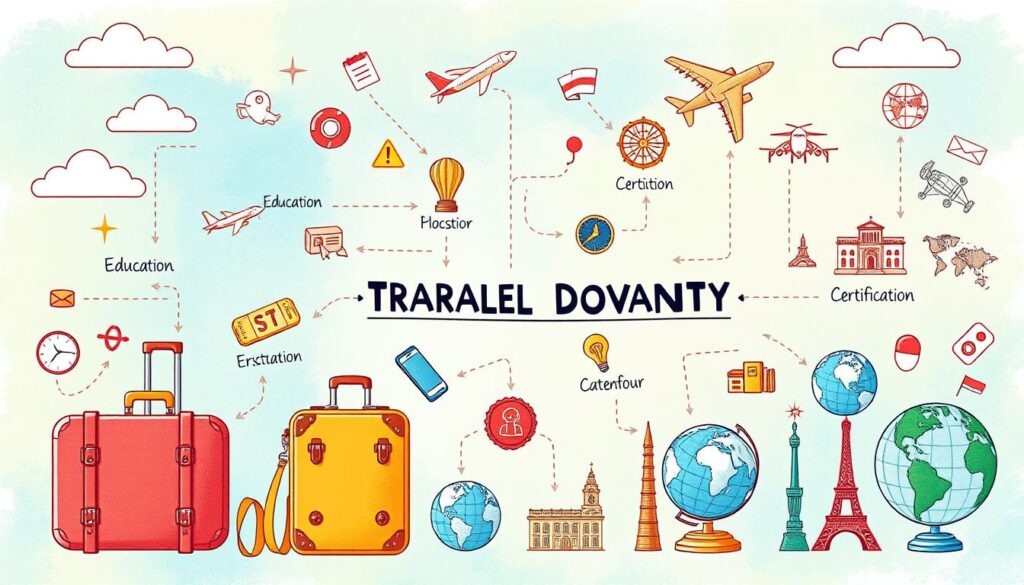How do i become a travel agent do you dream of turning your love for travel into a career? Imagine helping others create amazing memories around the world. It’s a dream that can come true.
The job of a travel agent has changed a lot lately. Now, 70% of travelers want unique experiences. This means travel agents are more than just bookers. They’re the ones who make trips unforgettable.
To be a travel agent, you need more than just knowledge of places. You must understand what clients want and use technology to connect with them. It’s about making trips special and creating lasting memories.
In this guide, we’ll share the secrets to starting your travel agent career. You’ll learn about the skills and certifications needed. We’ll show you how to make your love for travel into a fulfilling job.
Table of Contents
Understanding the Role of a Travel Agent
Starting a career as a travel agent is exciting for those who love helping others travel. It’s not just about booking trips. It’s about making each journey special and memorable.
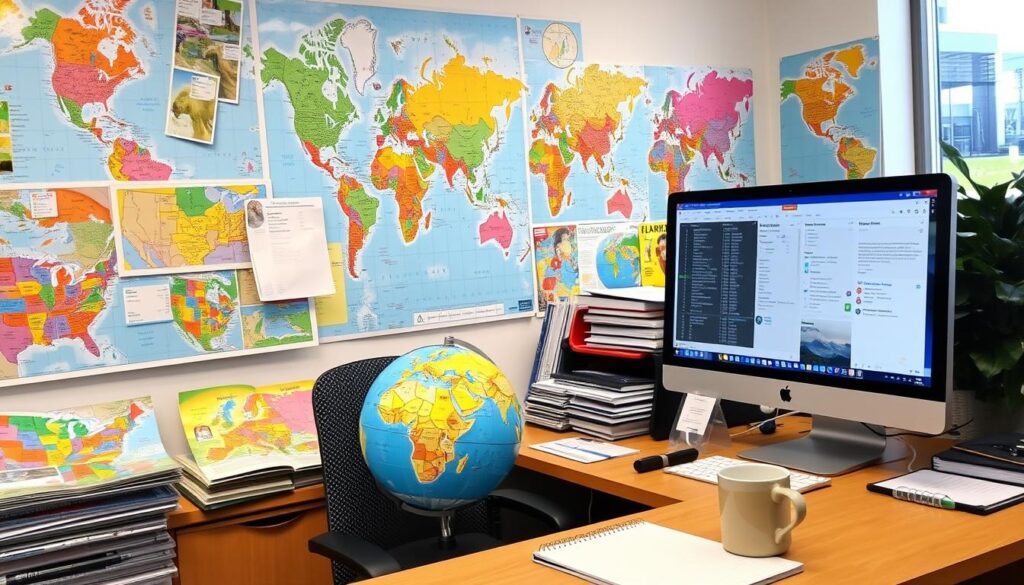
Travel agents are key in planning trips. They talk to clients, find the best places, and plan trips that go beyond what’s expected.
What Does a Travel Agent Do?
Being a travel agent means doing several important things:
- They talk to clients to know what they want.
- They look into places and travel options.
- They book everything from flights to hotels.
- They make detailed plans for trips.
- They give advice on travel documents.
Key Skills Required
To do well in this job, you need certain skills. Here’s what’s important:
| Skill Category | Key Competencies |
|---|---|
| Communication | Excellent at talking and writing |
| Technical | Good with booking software and online tools |
| Problem-Solving | Can think fast and solve travel problems |
| Customer Service | Good at listening and helping clients |
Your skill in handling travel plans and focusing on clients is key. Staying up-to-date with travel trends and using technology can make trips unforgettable for your clients.
Learn more about how to make travel experiences.
“Travel is about the gorgeous feeling of teetering in the unknown.” – Anthony Bourdain
Types of Travel Agents
Exploring the right travel agent career can change your life. The travel world has many paths for those who love to help others see new places. Knowing the different types of travel agents is key to finding your way.
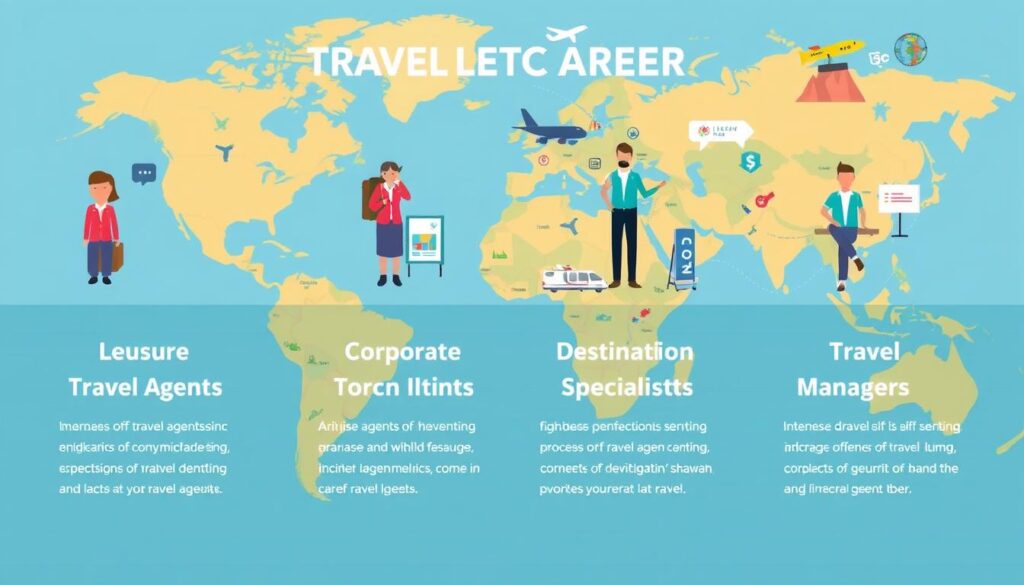
Corporate Travel Agents
Corporate travel agents deal with business trips. They work with companies to book travel for their employees. Your tasks could include:
- Negotiating corporate travel contracts
- Managing complex itineraries
- Tracking travel expenses
- Ensuring cost-effective travel solutions
Leisure Travel Agents
Leisure travel agents help plan dream vacations. They focus on making travel experiences unforgettable for people and families.
- Design custom vacation packages
- Recommend destinations and experiences
- Handle group and individual bookings
- Provide destination insights
Niche Travel Agents
Niche travel agents cater to specific markets. This offers unique career paths in the travel world. Some exciting niches include:
| Niche Market | Specialization Focus |
|---|---|
| Adventure Travel | Extreme sports, expedition planning |
| Luxury Travel | High-end experiences, exclusive destinations |
| Sustainable Travel | Eco-friendly trips, responsible tourism |
“Choose a travel agent specialization that aligns with your passion and strengths.” – Travel Industry Expert
Your journey as a travel agent is full of learning and discovery. Each area offers its own challenges and rewards. This lets you build a career that matches your interests and abilities.
Education Requirements for Travel Agents
Starting a career as a travel agent requires the right education. You need a solid foundation to succeed in the travel industry.

To become a travel agent, you need both formal education and specialized training. Choosing the right education can greatly improve your career.
High School Diploma or GED
First, you must get a high school diploma or GED. This education gives you basic skills like:
- Communication
- Basic mathematics
- Computer literacy
- Customer service principles
Relevant College Degrees
Many travel agents get college degrees in travel-related fields. Good degree options include:
- Tourism management
- Hospitality administration
- Business administration
- International relations
Specialized Travel Agent Training Programs
Travel agent training programs teach you industry-specific skills. They cover travel industry regulations and booking systems.
“Continuous learning is the key to success in the travel industry.” – Professional Travel Agent Association
Certification from groups like the American Society of Travel Advisors (ASTA) is valuable. It shows your dedication to your career.
Certifications That Enhance Your Career
To succeed in the travel industry, you need more than just a love for travel. Getting travel agent certification can open doors to new career paths. Employers look for people with special training and credentials that show they’re serious about their work.
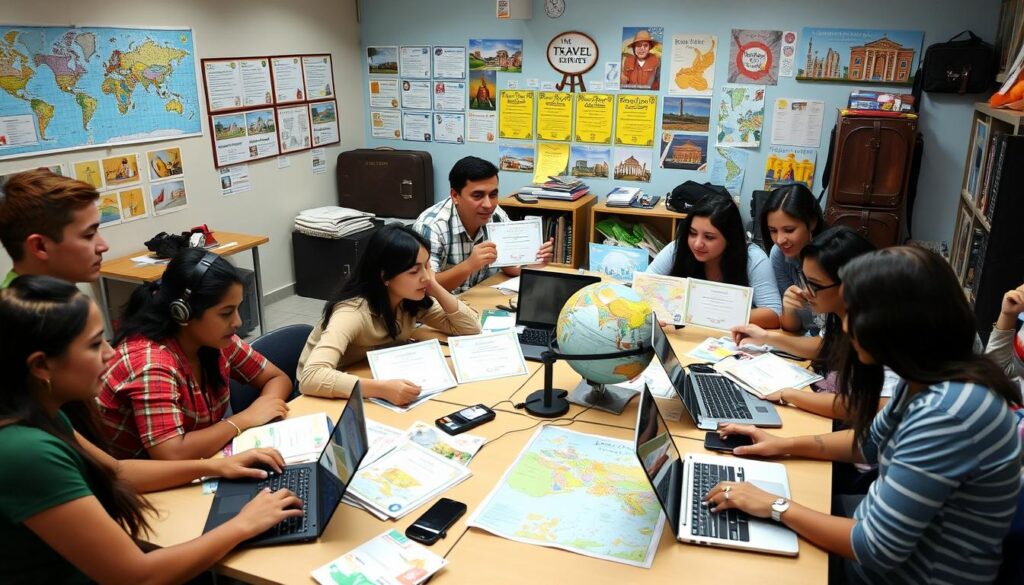
Having professional certifications can really help you stand out in the travel world. They show you’re always learning and getting better at your job. Many travel agent training programs help you move up in your career.
IATA Certification: Your Global Passport
The International Air Transport Association (IATA) certification is a top choice for travel pros. It gives you skills in:
- Advanced airline reservation techniques
- International travel regulations
- Comprehensive ticketing knowledge
CLIA Certification: Cruise Industry Expertise
Cruise Lines International Association (CLIA) certifications are great for those who love cruises. They offer different levels of training, each with its own benefits.
| Certification Level | Focus Area | Career Impact |
|---|---|---|
| Accredited Cruise Counselor | Basic Cruise Knowledge | Entry-Level Qualification |
| Certified Cruise Counselor | Advanced Cruise Expertise | Enhanced Professional Credibility |
| Master Cruise Counselor | Industry Leadership | Top-Tier Professional Status |
Travel Institute Programs: Comprehensive Professional Development
The Travel Institute has travel agent training programs for all sorts of specializations. Their certifications prove you’re an expert and serious about growing in your career.
“Certification is not just a piece of paper—it’s a testament to your dedication and passion for travel.” – Industry Expert
Investing in professional certifications shows you’re all in on excellence. It makes you a strong contender in the fast-paced travel industry.
Gaining Experience in the Industry
Learning to become a travel agent is more than just studying. Getting real-world experience is key to a successful career. This hands-on learning will make you stand out and help you master the skills needed.
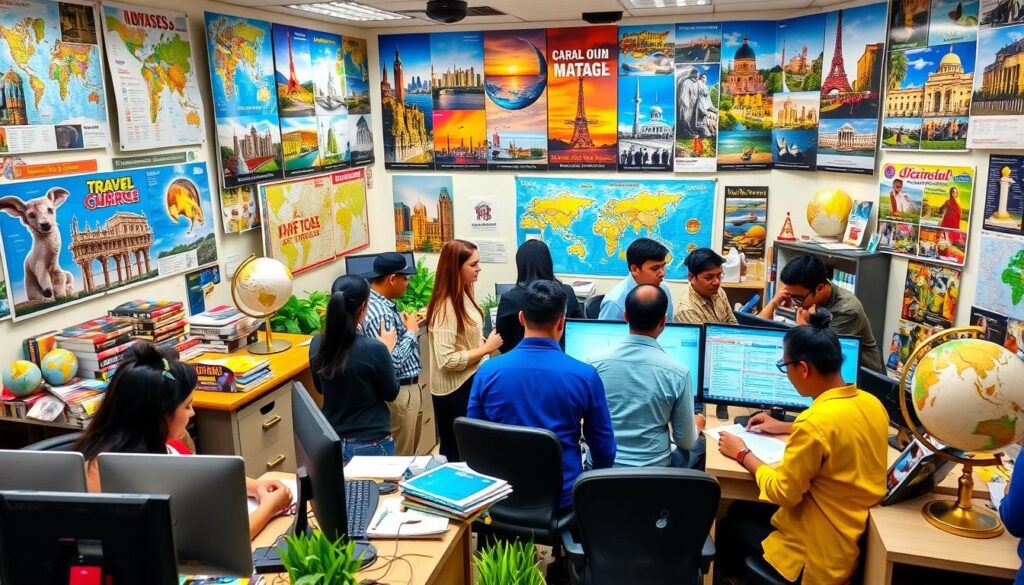
Internships and Entry-Level Positions
Internships are a great first step for those interested in becoming a travel agent. Many agencies offer entry-level jobs to help you start. These roles let you:
- Get real-world experience
- Learn about booking systems
- Improve your customer service skills
- Make important professional connections
Networking with Industry Professionals
Travel agents who succeed know the value of networking. Go to industry events, join groups like the American Society of Travel Advisors, and meet seasoned pros. They can mentor and guide you.
“Your network is your net worth in the travel industry.” – Travel Industry Expert
Volunteer Opportunities
Volunteering is a surprising but effective way to gain experience. Look for chances with:
- Local tourism boards
- Travel-related nonprofits
- Community travel events
- Cultural exchange programs
Pro tip: Every experience you get brings you closer to becoming a skilled travel agent. Stay curious, be proactive, and grab every chance to learn.
Choosing a Specialization
Choosing a specialization can make your travel agent job better and boost your career. The travel world has many areas you can focus on. This lets you match your passion with your career goals.
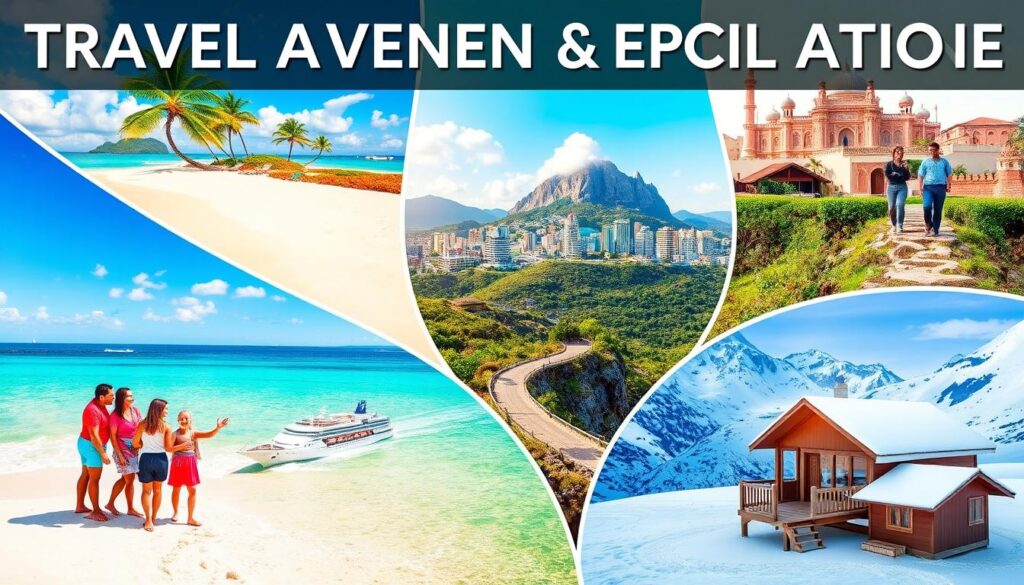
Good travel agents know the value of being an expert in certain areas. Picking a specialty can set you apart and draw clients who want unique experiences.
Adventure Travel: Crafting Extraordinary Experiences
Adventure travel experts plan trips for those who love excitement and exploring. Your job in this area includes:
- Creating itineraries for hiking, climbing, and extreme sports
- Understanding remote destination logistics
- Connecting with specialized adventure tour operators
- Ensuring client safety and comprehensive travel insurance
Luxury Travel: Curating Premium Experiences
Luxury travel agents focus on top-notch, personalized trips. Your job might include:
- Developing relationships with elite hospitality brands
- Arranging exclusive accommodations and experiences
- Providing white-glove customer service
- Understanding sophisticated client preferences
Sustainable Travel: Championing Responsible Tourism
Eco-conscious travelers look for agents who care about the planet. Specializing in green travel means:
- Identifying environmentally friendly destinations
- Recommending carbon-neutral travel options
- Supporting local communities through conscious travel
- Educating clients about sustainable travel practices
“Specialization transforms a travel agent from a booking service to a trusted travel curator.” – Travel Industry Expert
Every specialization brings its own set of skills and the chance to make travel experiences special for your clients.
Setting Up Your Travel Agency
Starting a travel agency needs careful planning and smart decisions. Knowing your business model is key for success. The job outlook for travel agents depends on how you start your career.

There are many ways to start your travel agency. Each path has its own benefits and challenges. These choices can guide your career.
Starting Your Own Agency
Starting your own agency gives you freedom. You’ll need to think about:
- Initial capital investment
- Business registration requirements
- Marketing and branding strategies
- Technology infrastructure
Joining an Existing Agency
Working with an established agency has big benefits. You’ll get:
- A ready client base
- Proven systems
- Training opportunities
- Less risk at start
Home-Based vs. Brick-and-Mortar Operations
| Business Model | Startup Costs | Flexibility | Client Perception |
|---|---|---|---|
| Home-Based | Low | High | Variable |
| Brick-and-Mortar | High | Low | Professional |
Choosing the right model depends on your goals, money, and market. The job outlook for travel agents is good for those who plan well.
“Success in the travel industry comes from understanding market needs and delivering exceptional customer experiences.” – Travel Industry Expert
Finding Suppliers and Partners
Starting a career as a travel agent means building strong ties with suppliers and partners. These connections are key to offering top-notch travel experiences to your clients.

To succeed in this field, you’ll need to form strategic partnerships. These partnerships give you an edge and open up new ways to serve your clients.
Connecting with Airlines and Hotels
Building relationships with airlines and hotels takes time and effort. Many agents use platforms like DMCFinder to connect with over 6,000 real travel experts worldwide.
- Research preferred airline and hotel partner programs
- Attend industry networking events
- Build rapport through consistent communication
- Understand commission structures
Working with Tour Operators
Tour operators are crucial for creating full travel packages. They play a big role in the industry, with an average salary of about $58,292 a year.
| Tour Operator Type | Specialization | Average Collaboration Benefits |
|---|---|---|
| Adventure Specialists | Outdoor and Expedition Travel | Unique Itineraries |
| Luxury Operators | High-End Experiences | Premium Client Services |
| Cultural Tour Providers | Immersive Destination Experiences | In-Depth Local Insights |
Selecting Travel Insurance Providers
Choosing the right travel insurance is vital for your clients’ safety. Look for providers with good coverage and fair commission rates.
“In the travel industry, your network is your net worth.” – Industry Expert
By picking and keeping the right suppliers, you lay a solid base for your career. Remember, strong partnerships are built on trust, clear communication, and mutual gain.
Using Technology in the Travel Industry
The digital world has changed the job of travel agents. Now, they use advanced digital tools to make planning trips easier and better for clients.
Today’s travel agent training focuses on using new tech. The travel world has seen big changes in technology. These changes help agents work better and serve their clients more effectively.
Booking and Management Software
Digital booking systems have changed how we manage travel. These tools offer:
- Real-time booking
- Instant price checks
- Tracking your trip
- Automated documents
Social Media Marketing Strategies
Social media is a big help for travel agents. Using online platforms lets agents show off places, share happy client stories, and talk to people who might travel.
Customer Relationship Management (CRM) Tools
CRM tools help travel agents:
- Make client interactions personal
- Keep track of talks with clients
- Plan marketing campaigns
- Manage what clients like
“Technology is not just a tool. It can give travelers the power to create, to learn, and to discover in ways never before possible.” – Unknown
By using these new technologies, travel agents stay up-to-date and competitive. They can offer top-notch, personalized service that meets today’s traveler’s needs.
Developing Your Marketing Strategy
Creating a strong marketing strategy is key to success in the how do i become a travel agent agent field. It helps you draw in and keep clients in a competitive market. A good marketing plan needs creativity, regular effort, and smart thinking.

Marketing is more than just ads. It’s about building a unique brand that speaks to travelers. It shows your knowledge and expertise in the travel industry.
Building Your Brand
Your personal brand is your most valuable asset. Think about these important points:
- Define what makes you special
- Have a consistent look and feel
- Tell engaging stories
- Show off your travel knowledge
Utilizing Social Media Platforms
Social media is a great way for travel agents to reach out to people. Here’s how to do it well:
| Platform | Strategy | Engagement Metrics |
|---|---|---|
| Show off travel experiences with pictures | Increase followers by 20% every quarter | |
| Use it for professional networking and sharing insights | Get 10 new professional connections every month | |
| TikTok | Make short videos about travel destinations | Get 5000 views on each video |
Networking and Referrals
“Your network is your net worth in the how do i become a travel agent industry.” – Travel Marketing Expert
Build relationships through smart networking:
- Go to industry events
- Join travel groups
- Start a referral program for your clients
- Work with other businesses that fit your niche
Keep working on your marketing to grow your travel agent career. Watch your numbers, adjust your plan, and love making travel dreams come true.
Understanding Travel Regulations and Policies
Travel regulations are a big part of a travel agent’s job. You need to know the laws that guide travel services.
Travel agents must keep up with important legal issues. These affect their work and the services they offer to clients. The certification process teaches you about these laws.
Familiarizing Yourself with Travel Laws
To be good at your job, you must know some key laws:
- International travel rules
- Passport and visa needs
- Transport safety rules
- Rules for traveling across borders
Understanding Consumer Rights
Knowing consumer protection laws is key to protecting your clients. This includes:
- Refund policies
- Cancellation rights
- Travel insurance details
- What to do if services are disrupted
“Knowing travel laws is not just a requirement, it’s a professional responsibility.” – Travel Industry Expert
Staying Updated on Travel Advisories
Keeping up with the latest is essential in travel. Here’s how:
- Check government travel sites
- Sign up for industry newsletters
- Go to seminars and workshops
- Connect with other travel pros
By understanding these laws, you’ll be more trusted and offer better service to your clients.
Maintaining Client Relationships
Learning about client relationships is key when you want to be a travel agent. Building strong connections is essential for success. Great customer service turns casual travelers into loyal clients.
Providing Exceptional Customer Service
Your skill in creating personalized experiences makes you stand out. Good client management means:
- Listening well to what clients want
- Thinking ahead about travel problems
- Offering advice that fits their needs
- Keeping in touch regularly
Strategic Follow-Up Techniques
Checking in after trips is more than just being nice—it’s smart. Staying in touch with clients after their trip helps you get feedback. It shows you care about their experience.
Encouraging Repeat Business
Make one-time travelers into loyal customers with these tips:
- Share personalized trip memories
- Give them special travel deals
- Start loyalty programs
- Keep them updated on destinations
“In travel, relationships are your most valuable currency.”
Mastering client relationships helps your business grow. It also creates unforgettable experiences that bring travelers back.
Continuing Education and Training
Staying ahead in the travel industry means always learning. Travel agent training programs are key for those wanting to stay competitive. About 82% of travel agents see continuing education as vital for success.
Professional development offers many ways to grow and learn. Here are some strategies to keep your skills sharp:
- Attend industry conferences to network and learn emerging trends
- Explore online courses specific to travel agent
- Participate in webinars from leading travel organizations
- Subscribe to reputable travel industry publications
Industry Conferences: Learning and Networking
Conferences are great for meeting experts and learning new things. They offer workshops, keynote speakers, and networking. These can greatly expand your knowledge.
Online Courses and Webinars
Digital learning has changed travel agent training. With a 30% rise in online courses, you can learn from anywhere. Platforms like Travel Learning Hub offer courses on destinations, booking, and marketing.
Subscribing to Trade Publications
Reading industry publications keeps you up-to-date. They help you understand trends and get insights from pros. Many offer special resources for certification and education.
“Continuous learning is the minimum requirement for success in any field.” – Brian Tracy
Investing in your development boosts your skills and client satisfaction. It makes you a trusted travel expert in a competitive market.
Financial Management for Travel Agents
Managing your finances is key to success in the travel industry. Knowing how to handle your money can make your agency thrive or struggle.
Pricing Your Services Strategically
When you start as a travel agent, setting the right prices is vital. Your pricing should consider several important things:
- Market rates for similar services
- Your expertise and specialization
- Value-added services you provide
- Competitive positioning
Crafting a Solid Agency Budget
Creating a budget needs careful planning and realistic goals. Here are key budget areas to focus on:
- Marketing expenses
- Technology and software subscriptions
- Professional development
- Administrative overhead
Understanding Commissions and Fees
Your main income will come from commission structures from travel suppliers. Most bookings have commission rates between 10-15%.
“Know your worth and price your services correctly. Your skills are worth it.”
Mastering financial management sets you up for success in the travel industry.
Conclusion: Taking the First Steps
Starting your journey to become a travel agent needs careful planning and hard work. It’s not just about loving to travel. You must prepare well and keep learning. Success comes from having a clear plan and using all the resources you can find.
Setting Your Career Goals
It’s key to set clear goals for your career. Decide what kind of travel you want to specialize in, like luxury or adventure. This way, you stand out in a field where many agencies lack proper certification. Specialized agencies often see higher customer satisfaction, up to 30% more.
Creating an Action Plan
Make a detailed plan to get into the travel industry. Think about starting a travel agency from home as a smart first move. Your plan should cover getting the right certifications, building professional connections, and using modern technology. Remember, only 35% of agencies use modern booking systems well.
Resources for Aspiring Travel Agents
Use professional groups, online courses, and industry events to improve your skills. Keep up with travel trends, new tech, and market changes. By always learning, you’ll be seen as a smart and informed professional. In an industry where 45% of travelers make quick decisions, being well-informed is crucial.

